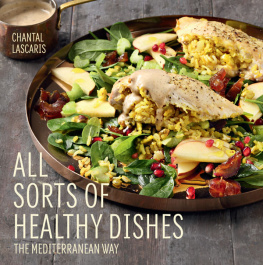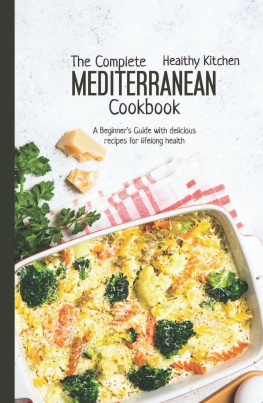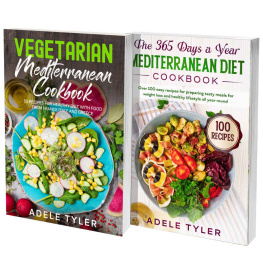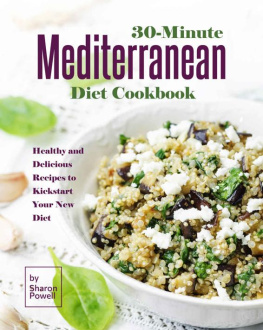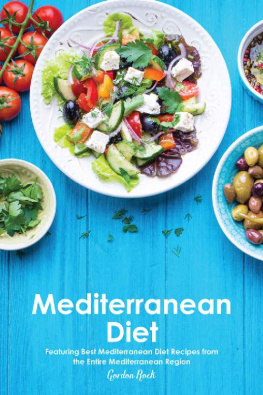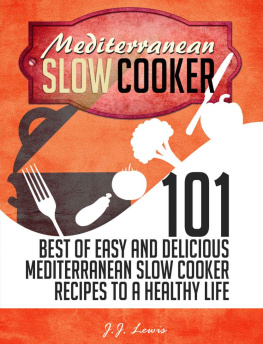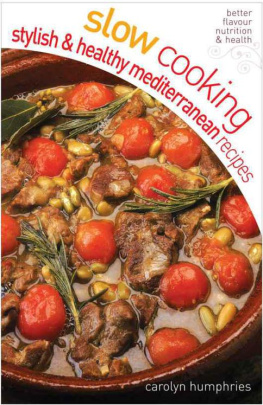
Published in 2017 by Struik Lifestyle
an imprint of Penguin Random House South Africa (Pty) Ltd
Company Reg. No. 1953/000441/07
The Estuaries, 4 Oxbow Crescent, Century Avenue, Century City, 7441
PO Box 1144, Cape Town 8000, South Africa
www.penguinrandomhouse.co.za
Copyright in published edition: Penguin Random House South Africa (Pty) Ltd 2017
Copyright in text: Chantal Lascaris 2017
Copyright in photographs: Penguin Random House South Africa Pty (Ltd) 2017
ISBN 978-1-43230-823-0
All rights reserved. No part of this publication may be reproduced, stored in a retrieval system or transmitted, in any form or by any means, electronic, digital, mechanical, photocopying, recording or otherwise, without the prior written permission of the publishers and the copyright owner(s).
Publisher: Linda de Villiers
Managing editor: Cecilia Barfield
Design manager and designer: Beverley Dodd
Proofreader and indexer: Joy Clack
Photographer: Henk Hattingh
Photographers assistants: Jomeri Mouton
Stylist: Luisa Farelo
Stylists assistant: Zani Malan
Penguin Random House is committed to a sustainable future for our business, our readers and our planet.
CONTENTS
INTRODUCTION
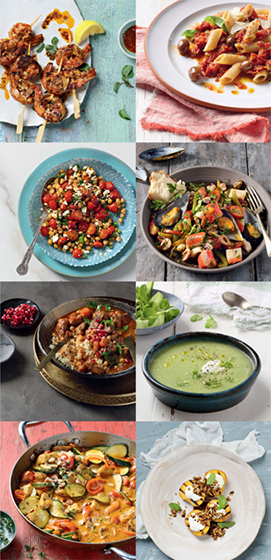
Ive been on many diets with varying degrees of success great success for the diets promoter, less success for me.
You can get a lot out of a diet, including all the things you can do without, such as added cholesterol, additional rolls around the waist, shaky hands and sweaty palms. What you really want are healthy meals that leave you feeling good. Which brings me to the Mediterranean and its sunshine cuisine.
I am lucky enough to have travelled regularly to various Mediterranean countries. Every time I returned home I felt healthier than before I left, which led me to conduct my own research into the Mediterranean way of eating. I wanted to find a way to incorporate elements of this culinary approach into my own quest for a healthy lifestyle once back in South Africa.
It was surprisingly easy. After all, much of South Africa and the Cape most particularly has a similar climate to many of the countries along the Mediterranean Sea and produces many of the ingredients that are integral to this way of eating.
But before I go any further, I should explain that the Mediterranean diet is not a diet at all; at least, not in the calorie-counting sense of the word. Rather, it is a way of eating and a lifestyle. Nor is it fancy food; originally it was considered peasant food, so its good and wholesome and the cooking techniques are simple. Ingredients that make up a typical Mediterranean meal are close to nature and seasonal, so theyre enjoyed at their tastiest and healthiest.
In the past, eating seasonally was the only way people could eat. Nowadays, its the only way we should eat, for our own good and the good of the planet.
There is a worldwide trend towards Mediterranean cuisine and lifestyle. Countless studies have shown that a traditional Mediterranean diet can help reduce the chances of developing type 2 diabetes and high blood pressure, while bringing down elevated levels of cholesterol all chronic health problems in South Africa. Sunshine cuisine includes plenty of vegetables, fruits, beans, brown rice, white meat and fish. There is also a strong emphasis on good fats such as olive oil and nuts. All these products are readily available in South Africa, or we have ingredients that can easily be substituted.
Happily, its also an affordable way of eating. In many Mediterranean dishes beans or lentils are the main source of protein and serving plants and whole grains is less expensive than serving packaged or processed foods.
THE PRINCIPLES OF A MEDITERRANEAN CULINARY LIFESTYLE
Eat fruits and vegetables as well as whole grains, nuts and legumes
A large part of every meal should consist of fruits and vegetables. Soups, crudits and salads can all amp up your plant-based intake. You can continue to freshen up by adding vegetables to other dishes. While youre at it, switch to wholegrain bread, pasta and rice. Nuts and fruit are perfect snacks.
Replace butter with olive oil
Olive oil is a healthy fat as it provides monounsaturated fat, which can help to reduce LDL cholesterol levels. It also contains phenols (strong antioxidants that fight free radicals and reduce inflammation). Use olive oil for dipping instead of sodium-rich processed dips and sauces. It should be the predominant fat in your diet.
Use herbs and spices to flavour food
Salt is a very unhealthy way of flavouring food. Its high in sodium and promotes high blood pressure. Rather switch to herbs, spices and garlic to add a delicious taste to your dishes. Herbs also have many health benefits another reason to use them instead of merely adding salt.
Limit red meat
For most people in South Africa this is probably the most daunting aspect of Mediterranean eating as we are accustomed to consuming large amounts of red meat. In contrast, Mediterranean peoples traditionally had limited access to this source of dietary protein due to the difficulty in rearing large herds of cattle in their rugged terrain. A cow eats 1015kg of grass a day. Fodder like that was simply not available. Lambs, sheep and goats were reared instead. For improved health we need to limit our intake of red meat to once or twice a week, also ensuring that its as lean as possible.
Eat fish and poultry
Fish is a major source of omega-3 fatty acids and is rich in other nutrients such as vitamin D and selenium. Fish and poultry are high in protein and low in saturated fat.
Drink red wine (optional)
A glass of wine a day can aid digestion (but remember, moderation is key). Red wine contains antioxidants as well as anti-inflammatory compounds and can help prevent heart disease.
Exercise regularly
People along the Mediterranean exercise naturally, as part of their everyday lives. Theres nothing like working the land for keeping fit. So we need to incorporate regular exercise into our modern lifestyles. It involves more than just hitting the gym for one hour three times a week. The easiest way to support the fitness habit is to walk more. Try parking your car further away from the shopping centre entrance. Take the stairs instead of the lift. Remember, to keep your weight down you must burn off more calories than you consume.
Share meals with others
One of the essential ingredients of this lifestyle is the custom of sharing meals with others. No sitting in front of the TV, quickly consuming a microwaved premade meal for Mediterranean families. They sit down together for a leisurely meal. Mealtimes are perfect for family bonding and reducing stress, a factor that contributes to many health conditions and detracts from quality of life.
SO YOU THINK YOU DONT HAVE TIME FOR THIS?
By now youre probably thinking, This is all very well, but how on earth can I follow this lifestyle when I dont have time to make my own meals? Relax! The dishes Ive formulated are based on a number of classic ideas from France, Greece, Italy, Morocco, Spain and Turkey. They all contain readily available ingredients while the recipes are easy to follow.
To make your life even easier, Ive suggested the vegetables and side dishes you might like to serve with each main course, to ensure that you will get enough of the plant-based foodstuffs that make this such a healthy way of eating.
Next page
